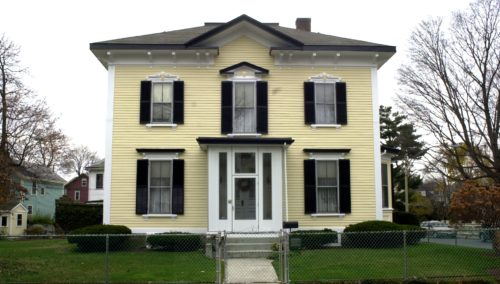 Today’s readings give us two different scenarios involving the “house” where we live, worship and pray. One tells of a house where Jesus has been made present, but things are not so good. The other is a house where Jesus is not present, but the faith of its owner surpasses many.
Today’s readings give us two different scenarios involving the “house” where we live, worship and pray. One tells of a house where Jesus has been made present, but things are not so good. The other is a house where Jesus is not present, but the faith of its owner surpasses many.
Somewhere between these two examples, our own houses are measured.
By that, I am referring not just to the homes in which we live, but also to our church homes, our parishes and congregations where we gather to worship. And one could even stretch this to include the “home” where we live, our cities and towns.
In the first reading, Paul writes a rather stern reprimand to the troubled Church in Corinth and the way in which it was conducting its weekly gatherings. Back in those days, there were no big churches or parishes … the still young Christians would instead meet in their houses.
The idea was to gather to break bread, share the cup, pray and reflect on God’s word, much like we do today. Instead, that unity had been broken apart by the development of factions within a group – something Paul describes as expected, even necessary, in order to illuminate those who were doing the right things.
But there were other problems. The chosen houses were not big enough for the entire community to join together; the wealthy among them were coming early to eat and drink, while the poor were left with little more than humiliation for depending on what was left over; and there was too much focus on drinking and eating altogether.
To sum it up, there was not much love in these weekly gatherings, which means there really was not much of a Eucharist.
Thinking back to our homes today – be it residential, church or community – do we embrace unity and love or do we simply hang our crucifixes, drape our palms and wear crosses like jewelry while forgetting the poor or the lessons of faith, hope and charity? Are we too often hypocritical after we accept Jesus under our roof?
Should we read Paul’s letter as if it were written to us?
Paul is clearly telling us that there can be no true Eucharist in a community whose members do not love one another.
Now to the Gospel, where a Roman centurion – whose Gentile home had not yet welcomed the Lord – sends a request to Jesus about a slave who is deathly ill, asking for a miracle healing. In other words, he wants the Lord’s presence in his house in order to cure a slave whom he no doubt loved – despite the fact he was not Jewish, nor had he embraced Jesus’ teachings.
Our Lord quickly agrees to visit the home. By this, it starts to become apparent that Jesus is not just present to save the Jews, but to also be the savior of Gentiles … the savior of all.
Luke tells us that upon hearing Jesus was coming to his house, he immediately sent word that his home was not worthy of his presence. Instead, if Jesus would only say the word, his servant would be healed. For those who are not Catholic, this exchange is called to mind at every Eucharist when we utter the words “Lord, I am not worthy that you should enter under my roof, but only say the word and my soul shall be healed.”
The Lord is impressed and sends his healing.
Perhaps our homes are like this. Maybe we have not completely welcome Jesus into our lives. And yet, he comes our way, eager to heal … if only we would ask.
So where is our home? Have we invited Jesus to enter … only to ignore him and carry on with our busy lives without love and compassion for each other? Or have we not invited him at all, but yearn for his mercy and forgiveness?
Either way, there is no doubt room for improvement, so long as we have the faith to believe it is possible. And with God, nothing is impossible.
